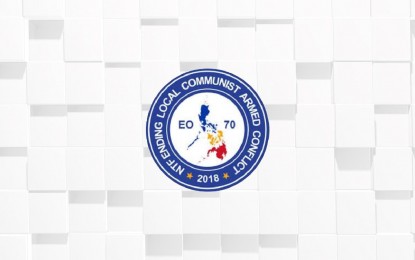
MANILA – The National Task Force to End Local Communist Armed Conflict (NTF-ELCAC) has criticized the “lack of factuality and legal basis” of the Commission on Human Rights (CHR)’s investigation reports on the government’s war on drugs.
In a statement on Friday, the NTF-ELCAC’s Legal Cooperation Cluster said the CHR’s conclusion that the “majority of the killings was done outside the context of law enforcement operation” was part of an “attempt to discredit and malign the government, both locally and even abroad”.
The NTF-ELCAC LCC cited that the CHR conclusions on the government’s alleged “failure on its obligation to respect and protect the human rights of every citizen” were not even supported by clear evidence.
It added that the human rights body’s conclusion also “seeks to push a narrative that the killings were sanctioned by the State”.
“However, nowhere in the CHR’s 48-page report is such conclusion supported by clear evidence – all but mere assumptions and surmises of CHR,” the statement read.
“If any, the deaths can be attributed to legal police operations, or at most, that the police officers on the ground may be liable. However, it needs a case to be filed in court to prove, and not for the CHR to conclude that it is sanctioned by the State,” added the statement.
The NTF-ELCAC likewise debunked another CHR conclusion that the government is “encouraging a culture of impunity”.
Citing the CHR's alleged witnesses for the “purported killings," the NTF-ELCAC said “no thorough investigations” were conducted to prove that their testimonies were “really credible”.
“Otherwise, if these witnesses are reliable, then the CHR is duty-bound to recommend charges against the alleged erring police officers instead of erroneously and irresponsibly putting the blame on the State,” it added.
Missing data
The anti-insurgency task force noted that the report did not include the involvement of drug syndicates in killing incidents.
“[The] fact that many of the deaths in the drug war were perpetrated by drug syndicates and drug groups themselves who kill their competitors. There is also no mention of the law enforcement officers and agents who lost their lives in the anti-drug campaign during this period. It is as if only the drug peddlers have human rights, but not the police officers who gave their lives in the line of duty to protect us,” it added.
To provide a proper and clear context, the NTF-ELCAC insisted that the CHR should have included additional data to better support its report, “instead of trying to paint a dark picture” of the drug war.
Among the data lacking were the number of arrests; cases filed in court; volume of drugs confiscated; number of drug surrenderers under Oplan Tokhang (Knocking); data of those who availed of rehabilitation; Balay Silangan project, which builds temporary shelters for drug offenders with the objective of reforming them into self-sufficient and law-abiding members of society; and decrease in the crime rate.
The NTF-ELCAC said the CHR, being an integral part of the government, should not demonize the very government it ought to serve and protect, especially if without basis.
It urged the CHR to assist the government to protect the human rights of police officers and the innocent public against the menace of illegal drugs, and to apply a fair approach before condemning the government without due process of law, “rather than maligning it”.
Recommendations
The recently released report titled “Investigated Killings In Relation to the Anti-Illegal Drug Campaign” said “drug-related killings have become rampant and widespread, occurring across the country’s regions during the administration of President Duterte”.
The human rights body said the slain victims “had actual or perceived links to illegal drugs”.
"They were killed with disproportionate and/or excessive force or in a brutal manner whether during alleged operations by law enforcers or during attacks by unidentified or private persons,” CHR stated in its conclusion.
“It must be emphasized that the Commission supports campaigns to combat the effects and proliferation of dangerous drugs, but it reminds the State that such measures must be coupled with a strong drive to promote due process, equal protection, full accountability, and the rule of law, thus, fulfilling its fundamental duty to uphold the rights and dignity of all,” the report read.
The report also recommended that the Office of the President “revise and/or remove the exceptions stated in Executive Order (EO) No. 2 and other issuances”.
EO No. 2 on Freedom of Information aims to promote an open government by increasing the transparency of the executive branch and its agencies. It strengthens the right to information as enshrined by the constitution.
According to the CHR, the said exceptions have been used as a basis for the denial of their subpoenas requesting documents.
“Based on the Commission's findings, this “presidential directive” has resulted in limited access to police documents relating to the drug-related killings, thus, curtailing its investigations,” the CHR stated. (PNA)
